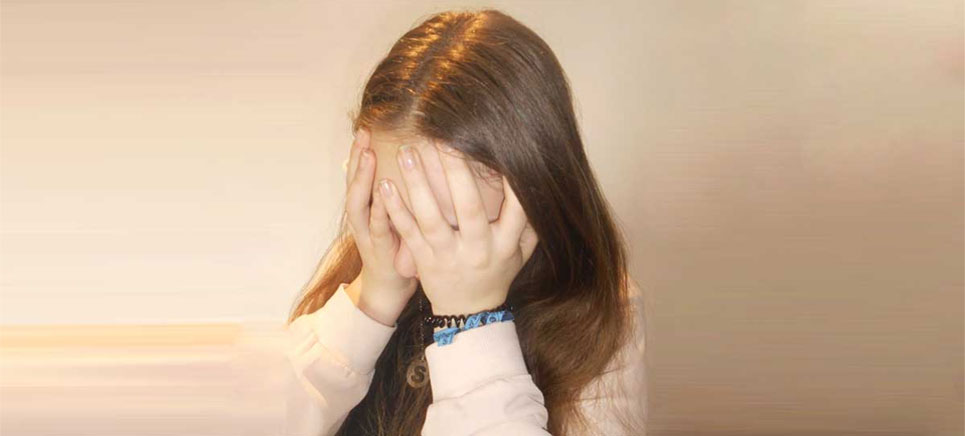The common perception we hold about childhood does not let us imagine that depression and childhood can be used in a single sentence. But, unfortunately, depression in children is as real as depression in adults. It’s even more complex because children cannot express their depressive feelings as clearly as adults. And, there’s a huge risk that a child’s depressive state of mind can be ignored by parents as their laziness or dullness. Depression in children is a serious illness but at the same time, it is treatable too. We just need to keep ourselves informed so that we can extend our support when a child around us needs it.
Recognizing the signs and symptoms of depression in a child
Not all children with depression show the same symptoms. But, the primary signs, just like adults, revolve around the feeling of sadness, hopelessness and mood changes. You can see some of the following symptoms in a child with a depressive disorder. But remember that just like adults, it is natural for children to feel ups and downs, you should be worried only when the symptom persists and interferes with their daily tasks.
1. Irritability or anger
If a child is mostly irritable or becomes angry frequently you need to pay attention to it.
2. Continuous feeling of sadness and hopelessness
When sadness becomes a second nature of your child you need to be alert. Persistent sadness and hopelessness are some of the most striking signs of depression.
3. Social withdrawal
If your child does not mingle with kids of her age or is not playful with adults of the family too, it may be a sign of social withdrawal. Although you need to make a distinction whether your child is naturally an introvert or she is showing signs of social withdrawal.

4. Increased sensitivity to rejection
Depressed children become very sensitive to rejections. They may get angry or frustrated very easily if you don’t pay attention to them or fulfill their demands instantly.
5. Changes in sleep and appetite
Abnormal increase or decrease in sleep or appetite may be a sign of depression. But, the change needs to stay for a while. If someday a child eats very little or sleeps more than her usual routine, you should not jump to the conclusion that she might be depressed.
6. Physical complaints that don’t respond to treatment
If your child complaints of any physical pain like headache, stomachache, etc. and the problem is not responding to treatment then your child might be sinking into a depressive state of mind.
7. Impaired thinking or concentration
If a child finds it hard to concentrate or their decision-making is impaired, chances are that the child is struggling from a mental disorder.
8. Self-criticism
If a child is always comparing and criticizing herself, if she thinks she is worthless, she might be struggling with depression.
9. Reduced ability to do the daily task
If your child starts struggling with her school works or normal daily routine, don’t label her as lazy or dull. Before scolding or punishing your child thinks that she might be mentally struggling with something.
10. Thoughts of death and suicide
This is one of the most severe symptoms that cannot be ignored at any cost. If your child talks or conveys by any means that she is thinking about death or suicide, she urgently needs professional help for her depression.
[Statistics show that girl child are more likely to attempt suicide when she feels depressed. And, a boy child is more likely to kill himself if he attempts suicide.]
What Causes Depression in Children?
Depression in children can be caused by any combination of factors including physical health, family history, life events, genetic vulnerability, biochemical disturbances etc. But, there are some factors that put some children in a higher risk zone for getting depressed.
- Children with a family history of depression are relatively at a higher risk of getting depressed.
- Those children who belong to a family where physical violence or alcohol abuse are common sinks into depression more easily.
- Children who witnessed any kind of sexual abuse or harassment are more likely to get depressed.
- Depression in children can come hidden behind other conditions like Attention Deficit Hyperactivity Disorder (ADHD), Obsessive-Compulsive Disorder (OCD), and Conduct Disorder (CD) etc.
Diagnosis of Depression in Children
If you have noticed the symptoms of depression in your child for more than two weeks, you should consult a mental health expert specialized in children. For evaluating your child the professional might ask for a private conversation with your child. The mental health evaluation will require interview sessions with the child and the primary caregiver. Some psychological tests too can be done if the doctor feels the need. You might also need to collect information about your child’s behavior by talking to her teacher, classmates and friends.
Don’t take stress if your child shows symptoms or is diagnosed with depression. It is a treatable ailment. You just need to support your child through the journey and take an informed decision about her medication, therapy and treatment. Your positive attitude will be really helpful for your child.
Use the citation below to add this article to your bibliography
"Childhood Depression: Meaning, Symptoms and Diagnosis." Wecapable.com. Web. April 3, 2025. <https://wecapable.com/childhood-depression-meaning-symptoms-diagnosis/>
Wecapable.com, "Childhood Depression: Meaning, Symptoms and Diagnosis." Accessed April 3, 2025. https://wecapable.com/childhood-depression-meaning-symptoms-diagnosis/
"Childhood Depression: Meaning, Symptoms and Diagnosis." (n.d.). Wecapable.com. Retrieved April 3, 2025 from https://wecapable.com/childhood-depression-meaning-symptoms-diagnosis/

Leave a Reply